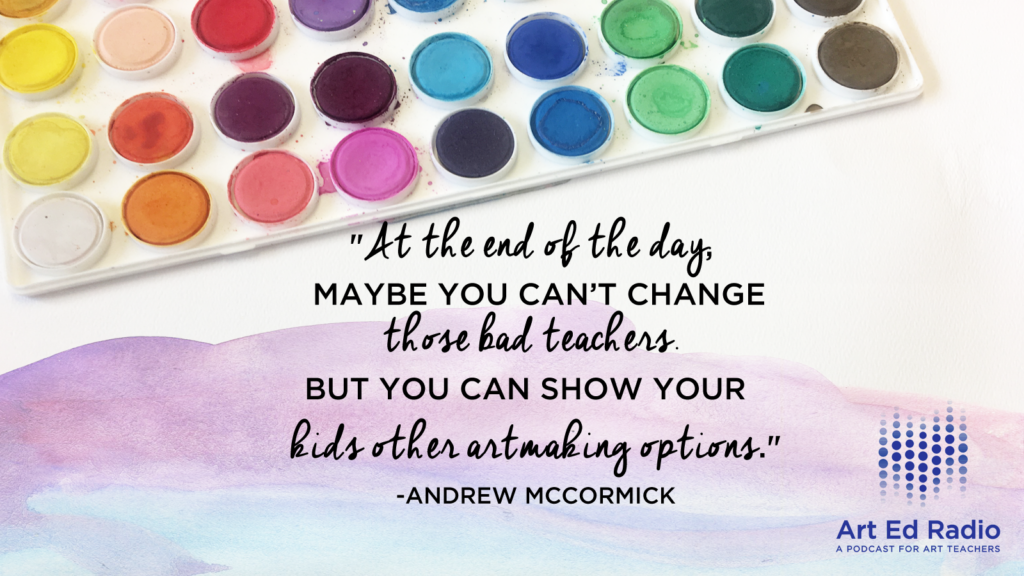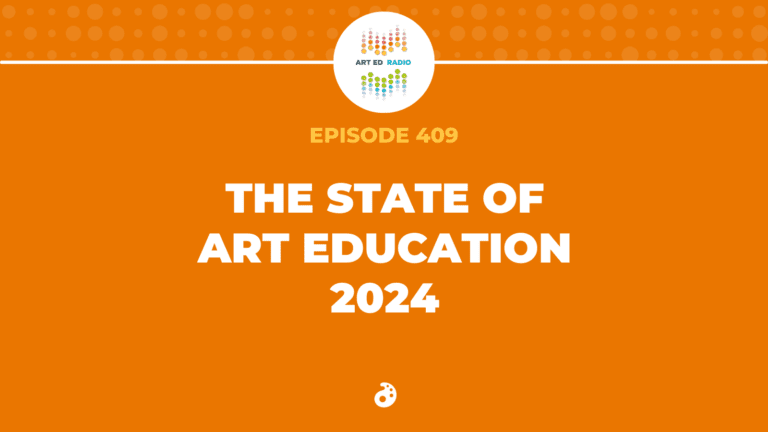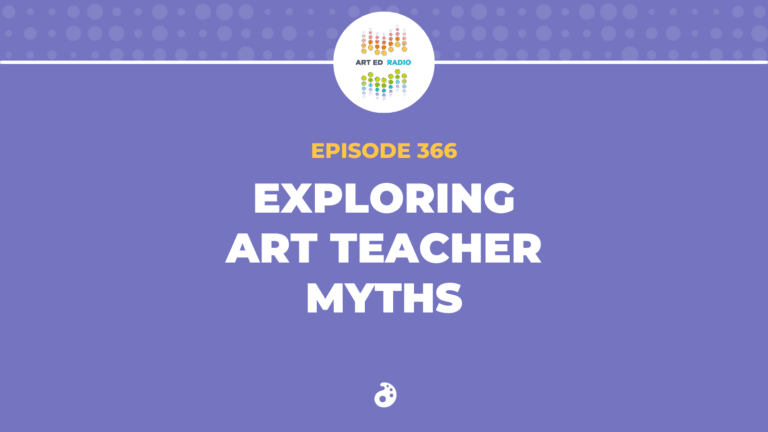A lot of teachers are dealing with some difficult colleagues–some so bad that they are bringing down the department. So how do we work with those teachers? Andrew brings Tim on the show to talk about how your art program can thrive even when you have a department killer on board. They discuss why every kid needs to be part of your program (9:00), whether you would rather work with talented kids or hard-working kids (11:30), and how to encourage students who might be stuck with a terrible teacher (18:15). Full episode transcript below.
Resources and Links
- Strategies to Recruit Students for Your Program
- Gaining the Confidence to Lead Your Art Department
- What Does Leadership Look Like for You?
- Ideas to Run Your Department Better

Transcript
Welcome to Art Ed Radio, the podcast for art teachers. This show is produced by The Art of Education, and I’m your host, Andrew McCormick.
I’m going to be completely honest. I think this episode is going to resonate primarily with our secondary teachers out there, but for all you elementary teachers, we all know that it can be really frustrating to build up a great elementary program and get your students super, super excited about taking art at the next level just to turn them over to a teacher or a department that you know is just going to undo and undermine all the strides that you’ve been making. We all know fellow art teachers like this, teachers that just repel students. They keep their numbers low, and I would say dangerously low. I call these teachers department killers.
Very few secondary teachers have the luxury of being a mandated required class. We have to be relatable. We have to be likable. Kids need to feel comfortable in our class, but it’s a balancing act because, at the same time, we don’t want to be just fluff and no substance. I believe that students really do like knowing that they’re going to learn something and be held accountable. I think this podcast talk is really timely as enrollment numbers for next year start rolling in and taking shape, and secondary teachers out there are looking at their class sizes and numbers and how that’s going to effect full-time positions for next year. We all know the consequences of having a department killer in our midst.
If you’re a junior teacher in your department, here’s the really insidious thing is that the actions and environment created by a senior teacher in your department, a department killer, that can actually effect your numbers and your enrollment and your job security. We’ve got to have some unsavory conversations here. I’m not trying to point the finger or throw anyone under the bus, but this is a problem that I think there’s a number of teachers out there that are dealing with. Who better to bring on for an unsavory talk and maybe someone who can throw a little shade than Tim Bogatz? Here’s the question. Do we simply tolerate these colleagues and hope and pray that they move on or eventually we just outlast them, or do we try and help them out? Is that even possible?
I have this hunch that a common trait in all department killers is that they’re stubborn. If they were flexible, they might not be driving students away to begin with. Are there other options out there for working with these department killers?
I’m just going to put this out. I think that being a department killer is really about the failure to connect with students. Maybe you think it may be tough to earn their respect. I would worry at what cost department killer is having students banging down your doors to take your classes. Maybe your classroom management strategies overall need a little bit of adjustment. It is possible to be tough, fair, consistent, and still have students like and respect you. If this sounds impossible, I would beg to differ. Picking up some new classroom management tricks might just help you out of a rut, if you are suspicious that you might a department killer. AOE’s class, Managing the Art Room is just the think that you might be looking for. The thing that I’ve always loved about AOE’s classes both as an instructor and as a student is connecting and sharing with a diverse group of quality art teachers.
Every month I teach, I work with amazing teachers that have loads of experience and knowledge. Don’t tell AOE this but sometimes I think I learned just as much teaching in class as the students do that are actually taking the class. Managing the art room is a two credit course that starts at the beginning of every month so head on over to artofed.com and check it out. All right so let’s bring on the big unsavory himself, Tim Bogatz, to see if we can shed some light on these most unsavory of colleagues.
Tim: Thanks for having me I’m excited to talk to you.
Andrew: Okay that makes one of us. To be honest I’m a little worried at what cost department killer is something that might give a little negative or throw a little shade at peoples. I think it’s something we got to talk about and maybe I’m just really curious about this because I kind of lived with a few or survived a few and I won’t name names of course but I’m just wondering, maybe is it me or have you also kind of encountered some other colleagues and other teachers [inaudible 00:03:38] department killer. If so, why do they did that? What do they do that?
Tim: Yeah I am lucky enough to not have had to work with anyone who was kind of a department killer but you see it, like you see it in your schools and I see it in other elected departments that were at my school. I don’t know that it’s necessarily something conscious that they’re doing like oh I really want to get rid of kids, maybe there are. I think for the most part it’s just people who aren’t really good teachers or enough to get kids excited about just the subject matter and if they’re not a good teacher or not a fun person to be around. It’s really tough to get kids excited about that, really tough to get kids signed up for the class and really willing to do the work. I think just from the lack of having a lot of those teaching abilities or skill or the right type of personality, you can kind of see the departments go down the drain. It may not be a conscious decision, maybe it is, maybe we can talk about that, but I think for the most part it’s just a lack of ability that sets those departments on a downward spiral.
Andrew: Do you think that when teachers … You know when we say teachers are just kind of chasing kids away and because we’re an elective, kids can either choose to take us or not, it’s not like science or math where everyone has to take it. You think sometimes those are the teachers who love teaching their content more than they love teaching students? If you get the difference of what I’m saying.
Tim: Yeah, I definitely do. I think we can see that a lot. I also think that a lot of teachers only have a certain type of kid that they want to teach, if that makes sense, where if maybe you have a kid with behavior issues or just a kid with a personality clash, they go out of their way to get those kids to try and drop the class or to try and find something else to take so they don’t have to deal … They don’t want to teach every kid, they only want to teach the best kid. For me, I think my insight is wrong in the first place but it really does set your department up for failure because you can’t just choose the kids that you want to take and expect your department to thrive, you need to be pulling in kids from everywhere if you want a healthy, active, exciting, art department.
Andrew: Right and I see. I’ve worked with some people like that. I mean maybe not side by side, but kind of like in parallel or maybe they’re the next level or the previous level and I actually got to disagree with you a little bit here because I think you said early on that you thought that this had to be accidental and maybe these people didn’t know it, I actually think some of these people know full well what they’re doing. When you hear about an art teacher who will say to a kid who chooses to take art as an elective, you’re not good at this, you should not take any more art. Just kind of flat out says that to kids.
What I’m describing is exactly what she said, a teacher who doesn’t want to deal with a kid who’s a behavioral issue or a kid who doesn’t have a high skill set and then it’s just like, what are you doing? You’ve made your art class only kids who are super good at art and have a ton of love for art and number one, you’re missing out on this whole swath of people that you could actually turn on to art and show them that art could be for them and creativity could be for them, but you’re also just like totally handicapping your numbers and then guess what? When the next year rolls around, guess which department looks real easy to cut? The one that you’ve like arbitrarily kept low. In some ways I think some of these teachers that do this are really like their own worst enemies in some ways.
Tim: Absolutely and I’m going to go back to that question that you asked, what are you doing here? For me, it’s not interesting to teach the kids that are going to succeed whether you’re there or not. I want to teach those kids who have struggled, kids that have potential, kids that you can help grow, kids that maybe didn’t love art and you can help them to love art. That’s why I got into teaching. There are so many kids out there that have so much ability and so much talent but they don’t know it yet and there’s no better feeling than to turn those kids on to art, to help them see how creative, how talented they are, and really show them everything that’s out there. I don’t understand the thinking or the mindset I guess, if you only want classes filled with kids that are already good. I will never understand that.
Andrew: I got to share a little story with you and then I’ll circle back to something else, I actually had that question come up today, just totally random. A girl in my eighth hour class, last period of the day she goes, “Mr. McCormick, do you like students better who are good at art?” I was just like, I could not make this question up and I was like, “Well you know,” and I told her honestly, I was like, “It’s great to work with kids who have a lot of ability and a lot of interest,” but I’ve had kids who have high abilities who think that their stuff doesn’t stink and they’re not coachable.
Give me a kid who maybe doesn’t have a great skill, but has a great attitude and stays open to suggestions and wants to get better. I’ll take that kid every single time over the kid with a ton of abilities and a bad attitude. Then I started telling her about even like a third tier of kid who’s a kid who has both a low skill set and a bad attitude that doesn’t want to be there, puts forth very little effort. Man, when you crack that kid and they do something and they discover something and they do work that they never thought that they could do before, my God that is like winning the lottery. I had that happen today too where a girl looked at her drawing and just said, literally she said, “I can’t believe I did this, I’m so proud.” I just stood there and I was like, you know the movie the Grinch, like where the Grinch’s heart, sortswhen it grows three sizes?
Tim: Yes.
Andrew: I was like that’s what I’m feeling like right now. I feel like the most special person in the world because it’s been a long journey with this student, twelve weeks, banging my head against a wall but we’re finally there okay, so to bring it back to department killers. Those are the sorts of experiences that those people don’t get to have. I think they’re doing themselves a disservice by not allowing that to happen.
Tim: Yeah, absolutely, and I think you’re missing out on the most rewarding parts of teaching. Your story illustrates that so clearly. You can go home, you can talk about that, that’s something that I can tell you’re genuinely excited about. People who have run off all of those types of kids are sitting there going home like, oh you know those kids who are good at art? They’re still good at art. There’s nothing that is inspiring about that. There’s nothing that’s really … I won’t say ‘nothing’, but there’s not as much that is rewarding in that type of teaching at least for me.
Andrew: Okay, so we talked about people who deliberately run kids off and how they’re just screwing themselves a little bit here with numbers. I actually think there’s another thing that teachers do and I think this is subconscious or not on purpose. They think that they’re being more serious and discipline based. By God, we’re going to teach these kids and I’ve got high standards and I’m a tough grader and if it’s average it’s a C and if it’s below average it’s a D or an F. You know what? You are not going to have kids take your program if you are doing that. I’ve known teachers like that. They think that they’re doing their kids a service by being tough and hard.
I actually think that there’s a way you can have your cake and eat it too. You can hold kids accountable but not be mean-spirited or unfair or super harsh or just piling on unrealistic expectations. I’ve actually found and I maybe want you to speak on this, I actually think some of the young teachers that I’ve encountered, people who are 24 25 maybe because they’re teaching secondary kids who are 17 18 and there’s not that big of an age difference, they almost feel like they have to overcompensate for their youngness so they’re like extra mean and it’s like, you didn’t have to be mean and salty to your students to get them to respect you. You’re just chasing kids away. Have you ever noticed that or seen other teachers that do that?
Tim: Yeah absolutely. I actually have noticed it in myself as well. When I first started teaching high school I really thought that classroom management was all about consequences and being reactive and this sort of punishment. As I went through and taught more and more, you slowly start to realize that your best classroom strategies are about engagement and exciting projects and helping kids to get excited about art. If you put it down in one sentence, our job should be to get kids excited about making art. It’s really tough to do that when you are so focused, like you said, on consequences and laying down the law and being so difficult with things. It’s tough for kids to get excited about art in an environment like that.
I think, yeah, there are a lot of teachers with that mindset and I think it takes a little bit of time and it did in my case to realize that if you want to really build your department, if you really want to get kids excited about making art, you need to have the right type of environment, the right type of classroom culture. That’s something that needs to be built and it’s something that you need to consciously think about if you do really want your department to thrive.
Andrew: Right, so let’s talk about departments then because if you’re a multi-person department you might be literally working right next door to someone who, despite your best efforts, is undermining what you’re trying to achieve and what you’re trying to build or if you’re a singleton and you’re the only elementary teacher, or you’re the only middle school teacher, and you know the next person is just going to chase these kids away. Those are two slightly different situations.
Now, that I’m sufficiently lathered up and angry, now I want to talk about solutions. How do you as a fellow colleague, how do we deal with those people? There are a couple different things we could do, I mean you could just hope that they move on. You could ignore it and hope that your little world is good or you could try to make them better. Do you have tips for dealing with these unfortunate situations?
Tim: Well, at my core I’m antisocial so I think that idea of my own little world is really what’s appealing to me. I think for the betterment of the kids that are there and your department as a whole, I think you need to try and improve what’s happening in the room next year with the teacher that you’re working with because there are … Share your best ideas. Share your best grading practices. Share cool things that you’re doing that maybe build that culture that we were talking about. Maybe they’ll accept it, or maybe they won’t but you need to at least try. You can’t just let something that’s not working continue to not work. You need to do what you can to improve that and there’s no harm in trying that.
If we take it back to what we were just talking about getting kids to love art, the classroom is not the only place that art is made. If you had kids in drawing class this semester that are moving to that teachers painting class next semester and they know that they’re not going to like that, they know they’re not excited about it. Painting class is not the only place they can make art. If they’re moving up to the high school, that’s not the only place that they can create, be creative, and make things. I think you just need to establish that idea where it’s not necessarily about what you make in class, that’s not the only place to do things. It’s about what you can create just for yourself and on your own and you can do that anywhere, at home, in sketch books, wherever. The act of creating is not exclusive to the classroom. If you can instill that, that love for art, that love for art making in your kids, you can sort of side step those teachers that may be not up to the standards you want.
Andrew: Yeah, that’s a really good idea because I mean I think if someone is … I think a key stone trait of someone who’s a department killer is someone who’s like, “I’m not changing, I’ve been doing it this way for a long time.” We can talk about sharing is caring and we’re going to share out best practices or cool project, but man if they want to cross their arms and not listen and do it the way they’ve been doing it, chances are that’s how it’s going to be.
I appreciate the attitude of let’s share, let’s take them to a state conference, let’s take them to art ed now conference and show them some cool stuff and get them excited. Take a class together over the summer where you’re learning something new and I guess try to break down some of those walls. At the end of the day, maybe you can’t change that person. For your students to understand that there are different alternatives. Maybe there’s an art center in the community that fulfills their needs. That’s what I think, as art teachers, whatever level you’re at, elementary, middle, or high school to have an open door policy with your students because you might be the last good place for your students to come and show their work and get some feedback, maybe they’re not getting it at their current level.
Tim: Absolutely and I think you always need to be open with them for opportunities, for chances that they may see it to make art, maybe you have a list of sketchbook ideas that you can pass them, just to keep them working to keep them creating. Just because you don’t have them in doesn’t mean you need to lose contact with them. You can still support those kid. You can still teach those kids and that idea of an open door policy is a great way to go about it.
Andrew: Okay, man, so I want to bring it all together with a really weird, broad question that again sometimes I just need to bring you on these podcasts to affirm that I’m not crazy or maybe I am.
Tim: I don’t know if I help with that to be honest.
Andrew: I don’t think you do. I think you’re probably feeding into my own insecurity. Okay, so we’ve both been teaching for awhile and one of the things that I worry about is that every year, I get a little bit older, a little bit more experienced, that’s a positive way of saying it. In a negative way, perhaps I’m getting a little bit more cynical and jaded and pessimistic. Do you think that there’s a link between time spent in the game and you’ve been here for 25 years and you’ve seen every initiative come and go and this too shall past and here’s a new administrator and here’s a new this and that. I mean, do you think that there’s something to that, the more time you spend teaching the more apt you are to become one of these department killers? If so, what do you think we can do to safe guard ourselves from becoming that person?
Tim: Well I will say that yes, I see that a lot, I have seen that a lot. I think correlation does not equal causation. I mean just because you’ve been around doesn’t mean that you’re automatically going to become cynical, you’re going to become jaded. I think, if we go back to your last answer, what we were just talking about, continuing to develop, continuing to get better as a teacher should be your ultimate goal no matter how long you’ve been there. I think if you have the right mindset, as far as there are always new opportunities, there are new materials to try, there are new projects. There are always things that you can get better at whether it be assessment classroom management, just pick something and constantly be on the look out for ways to improve. I think, you and I both do that. I think everybody listening to this podcast does that.
The important thing is you need to keep that mindset going because you need to be involved in your own professional development. You need to continue to read, continue to envelop new ideas and bring those into your classroom. I think as long as you can keep that habit going, as long as you can keep the correct mindset, you can avoid turning things off, becoming a department killer yourself. Following that, that mindset and continually trying to improve no matter how long you’ve been at it, I think is of paramount importance.
Andrew: Well put man and I appreciate you coming on in late April early May to give me a little pep talk to prevent my pessimistic streak from coming out because I think that’s what it’s all about. It’s about staying open and just trying new things and keeping it fresh. Keeping it fresh for you and the kids. I appreciate the talk man.
Tim: Yeah absolutely. Yeah, everybody out there, everybody who’s listening, just keep the mindset right and finish strong. We’re getting close to the end, let’s make sure we finish strong. We’ll be good.
Andrew: All right Tim, thanks for coming on man. I appreciate it.
Tim: Yeah we’ll talk to you later.
Andrew: All right I want to call Tim out on something here. This whole notion of him being antisocial, my God man you’re an art teacher. You are just so full of it. You’re not really a curmudgeon or antisocial. As art teachers we are, by nature, extroverted and empathic. I think the interesting thing here though, and perhaps this is a different podcast, me personally I am very extroverted and charismatic as a teacher. Then in my own personal life, I’m basically grumpy cat. I think Tim would agree, both me and for him.
Big take aways, it’s a tough situation to be in, but it sounds like it’s pretty common to work with these people or have them in our midst. Do what you can and I believe this sounds corny, but it’s true, sharing is caring. Maybe try to inspire this person to take care of their own professional development. Take charge of it. Rekindle their own batteries and creative juices. In the end, if they are so set in their ways and determined to run kids off and only work with the best of the best, to the detriment of their very own department. It’s tough. I think as a teacher who cares for kids, we have to stay available and stay open for our students, past and present. Keep an open door and like Tim said, we got to show them that there are some other avenues out there for them to make art work and to be creative. It’s all about their creativity and their artistic growth. Maybe, just maybe, this is the thing that will shake these people up a little bit, showing them that it’s all about the kids.
Art Ed Radio is developed, produced, and supported by the art of education with audio engineering by Michael Crocker. Since we’re speaking about professional development, you know it’s never too early to start making your summer PD plans. What are you going to be doing on August 3rd? Attending the Art Ed Now Conference. That’s a good answer. Join a ton of other awesome art teachers out there for some PD done right. Head on over to the artofed.com and check it out now. While you’re there, go ahead and check out some past episodes of art ed radio. As always, new episodes of art ed radio are released every Tuesday and additional content can be found under the podcast tab on the artofed.com. All right, thanks for listening.
Magazine articles and podcasts are opinions of professional education contributors and do not necessarily represent the position of the Art of Education University (AOEU) or its academic offerings. Contributors use terms in the way they are most often talked about in the scope of their educational experiences.



